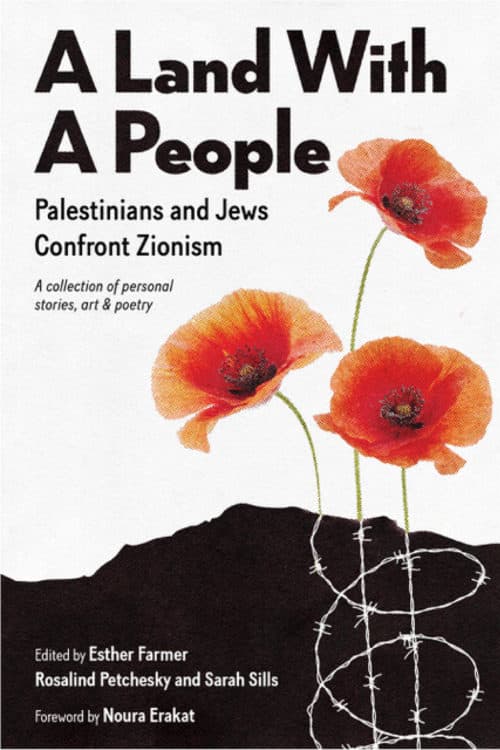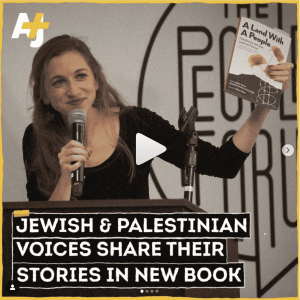By Esther Farmer, Rosalind Petchesky and Sarah Sills, in Mondoweiss
At a moment when Israeli apartheid, expulsions, and ruthless settler violence have escalated daily throughout ‘48 Israel and the Occupied Palestinian Territories, another damning report on these atrocities has just been released, this one by Amnesty International. In this context, we are proud to introduce Mondoweiss readers to our new co-edited book, A Land With A People: Palestinians and Jews Confront Zionism.
Published by Monthly Review Press at the end of 2021, A Land With A People will help put many of the Amnesty report’s legal conclusions into a powerfully felt human perspective. It is a book of personal stories, history, poetry, and art that elevates voices and visions rarely heard on the question of Zionism’s impact on Palestinians and Jews. A Land With A People highlights the narratives of secular, Muslim, Christian, and queer Palestinians–in Gaza and the diaspora–who endure the particular brand of settler colonialism and displacement known as Zionism. Likewise, it features stories about the transformational journeys of Ashkenazi, Mizrahi, queer, and Palestinian Jews of different generations who have come to reject the received Zionist narrative. Framed in a detailed history, critical analysis and historical timeline of nearly 150 years of Palestinian, Jewish and left secular resistance to Zionism, our project has always rejected a “both sides” approach in favor of one that reveals outrageous power differentials. We hope it stands as a contribution to the global movements against all forms of racism and colonialism and toward coalitions for a more just and decolonized future.
A Land With A People is the most recent contribution to a constellation of projects that began as a Jewish Voice for Peace study group on Zionism and then a booklet of personal stories titled Confronting Zionism. It evolved into a Readers Theater whose performances of “Wrestling with Zionism” were held in numerous venues throughout the New York metropolitan area and in which many local Palestinians shared their stories. The project continues in multiple formats, bringing the book and its messages to online and in-person audiences in the U.S. and Palestine. It has spawned numerous new storytelling projects and study groups and, most recently, an art and story exchange with youth in Gaza.
All of this is bound to provoke controversy and even a certain amount of backlash. We address this certainty in the book’s historical introduction (Rosalind Petchesky, “Zionism’s Twilight: Colonial Dreams, Racist Nightmares, Liberated Futures”):
Those who berate Zionism’s critics—and undoubtedly will target this book—often complain we are unfairly “singling out” Israel. Quite the contrary is true. A main purpose of A Land With A People, and of this historical introduction, is to show how Zionism is of a piece with many other cases of settler colonialism and racism. The point is to see how Zionism is not exceptional or deserving of exoneration—and for all of us, as Jews and Palestinians, to grieve and denounce its willing participation in the wrongs of colonialism and apartheid that have afflicted most settler and post-colonial societies. What is exceptional is Palestinians’ refusal to give up.
One of the extraordinary Palestinians who refuses to give up, even in exile, is one of the book’s contributors and “Wrestling with Zionism” performer, Riham Barghouti.
Watch the Al Jazeera clip featuring the live launch at The People’s Forum, here.
During the in-person launch for A Land With A People, held at The People’s Forum in New York City on December 15, 2021, Riham spoke about her participation in the project and what it means for Palestinians:
“…I was born into a people being dispossessed, a history being erased, a culture being appropriated, a land being confiscated.
But I was also born into a family whose mind refused to be colonized. I was born into resistance.
My grandmother ran guns for the resistance in the 1930s. My aunts were all activists supporting the cause in various ways. My aunt’s husband, Ahmed Qatamesh, has been arrested seven times [and] held imprisoned for a total of fourteen years under administrative detention – without charge or trial. Ultimately, each time he is released because there are no charges against him, only to be rearrested as he was most recently [in October 2021].
Both my parents were political activists – mind you on opposite sides of the Palestinian political spectrum; my father was an ardent Arafat supporter while my mother leaned left. I leaned with her!
I was raised on liberation songs and dabka and political debates that went long into the night. I walked the streets of New York in protest from Second Avenue in front of the Israeli embassy to Atlantic Avenue through the largest Arab community in New York at the time. I remember one demo when I was scheduled to take part in a civil disobedience action. However, when I saw police dragging people off the street literally pulling one man’s shirt off, I promptly got up and walked back to the demo, only to have my mother ask in puzzlement and with a little bit of disappointment, “why didn’t you get arrested?” I explained to her that is not what most parents hope for their children!
So, for me it was not a question of if I would resist but merely how I would contribute to my people’s struggle. I don’t see myself as a writer, but I welcomed the opportunity to participate in this project. It provided me with a new avenue to contribute to the Palestinian struggle.
Participating in the book gave me hope…it is a manifestation of my vision of liberation. What this book epitomizes is that it does not matter if you are a queer Southern Palestinian woman, a Muslim Gazan man, a self-identified Palestinian Jew, a refugee living in Syria, Lebanon or Jordan, or an Israeli Jew raised in a kibbutz, you are my people.
The dichotomy is not one of Israeli vs. Palestinian or Jew v. Muslim and Christian; it is one of colonizer vs. anti-colonizer, it is one of those who maintain and perpetuate oppression and those who oppose it. It is one of Zionist vs. anti-Zionist.
So, you are all my people because my people are anyone that stands for justice – no matter how you got here. By presenting our collective narratives, I hope this book will help decolonize the reader’s mind so that more and more of us can be born into resistance. . . .”
Read the rest of the article at Mondoweiss.

A Land With a People: Palestinians and Jews Confront Zionism, edited by Esther Farmer, Rosalind Petchesky & Sarah Sills.

Comments are closed.